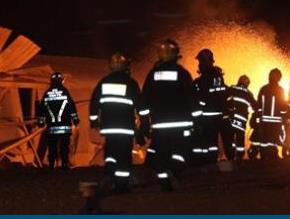|
World Jewish News

Firefighters extinguishing a blaze caused by Katyusha rockets, northern Israel, Nov 29, 2011(Photo by Yaron Kaminsky, Haartez.com)
|
Four Katyusha rockets from Lebanon hit northern Israel, gas tank struck
29.11.2011, Israel Four Katyusha rockets were fired from Lebanon at northern Israel on Monday night, causing damage to buildings and igniting a blaze that firefighters fought for hours. One of the 22-millimeter rockets struck a gas tank. No casualties were reported.
The Israel Defense Forces responded to the rockets by firing artillery rounds. Police and IDF forces scanned the area in search of more rockets and were able to confirm that four rockets had struck.
The Northern District Police raised its level of alert, but did not issue instructions for northern Israel's residents to enter bomb shelters, and no alarm was sounded.
The IDF called the incident serious and said it holds the Lebanese government responsible for stopping rocket fire.
Israel's security services do not believe Hezbollah is responsible for the overnight attack, but blame a smaller faction instead, likely to be linked to the global jihad movement. Those operating with the global jihad in southern Lebanon are known to be Palestinians.
This is the first disturbance of its type in almost two years and the eighth since the cease fire ended the Second Lebanon War. So far, one Israeli has been wounded in those incidents.
The Israel Defense Forces responded to the fire with artillery directed at the source of the attack.
Hezbollah leader Hassan Nasrallah hinted earlier this month that an Israeli attack on Iran or Western military involvement in Syria would lead to confrontation between Hezbollah and Israel. “I’m not issuing threats, but it’s plain to see that an Israel-American attack on Iran or military involvement in Syria will lead to a regional war,” Nasrallah said.
No organization has yet to take responsibility the rocket fire.
The Israeli-Lebanese border has been largely quiet in recent years, though some have worried about a possible spillover of tensions from a months-old revolt in Syria against President Bashar Assad and from a stiffening of Western sanctions against Iran over its nuclear program.
By Jack Khoury, Eli Ashkenazi, Gili Cohen and Reuters
Haaretz.com
|
|
